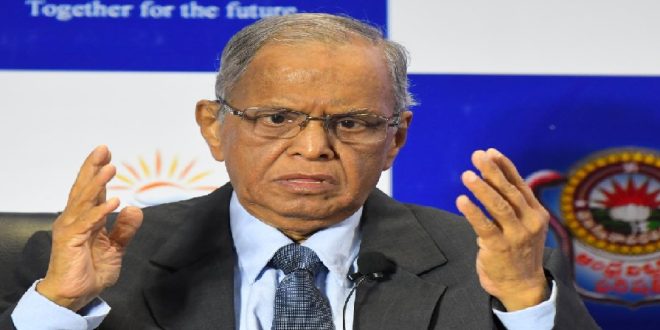03-11-2023
Bureau Report + Agencies
NEW DELHI: How many hours should a person work in a week?
That’s the question being asked in India over the past few days after software billionaire NR Narayana Murthy, the father-in-law of UK Prime Minister Rishi Sunak – said that young people should be ready to work 70 hours a week to help the country’s development.
 “India’s work productivity is one of the lowest in the world,” he said on a podcast recently. “Unless we improve our work productivity… we will not be able to compete with those countries that have made tremendous progress.”
“India’s work productivity is one of the lowest in the world,” he said on a podcast recently. “Unless we improve our work productivity… we will not be able to compete with those countries that have made tremendous progress.”
“So, therefore, my request is that our youngsters must say, ‘This is my country. I’d like to work 70 hours a week’,” he added.
After the comments went viral, Murthy received both support and criticism as people on social media and the opinion pages of newspapers debated “toxic” work cultures, and what employers can expect from the people they hire.
Some of the criticism came from people who pointed out the starting salaries typically on the low end for engineers in Indian technology companies including Infosys, which Murthy co-founded.
Others focused on the physical and mental health issues that could arise from working without a break.
“No time to socialise, no time to talk to family, no time to exercise, no time for recreation. Not to mention companies expect people to answer emails and calls after work hours also. Then wonder why young people are getting heart attacks?”
 Dr Deepak Krishnamurthy, a Bengaluru-based cardiologist, wrote on X (formerly Twitter) and some pointed out that most women worked much more than 70 hours a week at both the office and their homes.
Dr Deepak Krishnamurthy, a Bengaluru-based cardiologist, wrote on X (formerly Twitter) and some pointed out that most women worked much more than 70 hours a week at both the office and their homes.
The debate comes at a time when around the world, the Covid-19 pandemic has made people re-evaluate their relationship with work. Many felt that they were more productive when they worked from home while others advocated for a healthy work-life balance.
Experts say there are benefits to this, not just for employees.
“Companies that implement work-life balance policies benefit from increased retention of current employees, improved recruitment, lower rates of absenteeism and higher productivity,” said the International Labour Organization (ILO) in a report released last year, citing a study of 45 companies in the US.
Indians already work long hours, according to the ILO report, Indians worked an average of more than 2,000 hours every year before the pandemic, much higher than the US, Brazil and Germany.
 Pressmediaofindia
Pressmediaofindia




